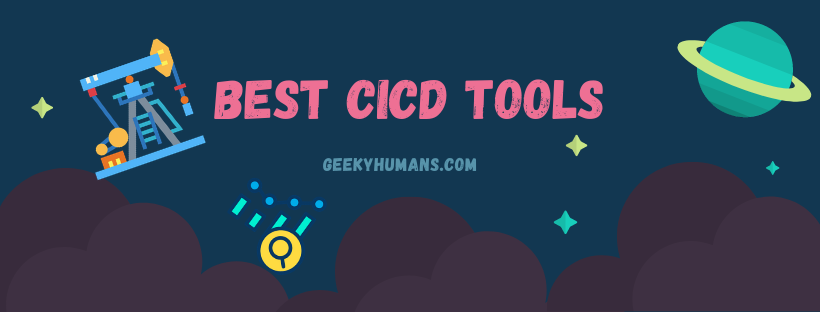CICD is the practice of frequently building and testing each change made to a codebase. It involves developers uploading new code, or code changes, to a common code repository, which is then tested automatically at the time of upload to ensure changes don’t cause any issues or breaks. The best CICD tools provide a lot of opportunity in CICD and automate most of the deployment task to save time and cost.
By automating tests, users ensure immediately their code is sound and that important software features are operating as expected. By consolidating code to a unified source and testing for code flaws early on in a project or sprint, development teams can save time and prevent delays in the delivery of new software, applications, and features.
Jenkins
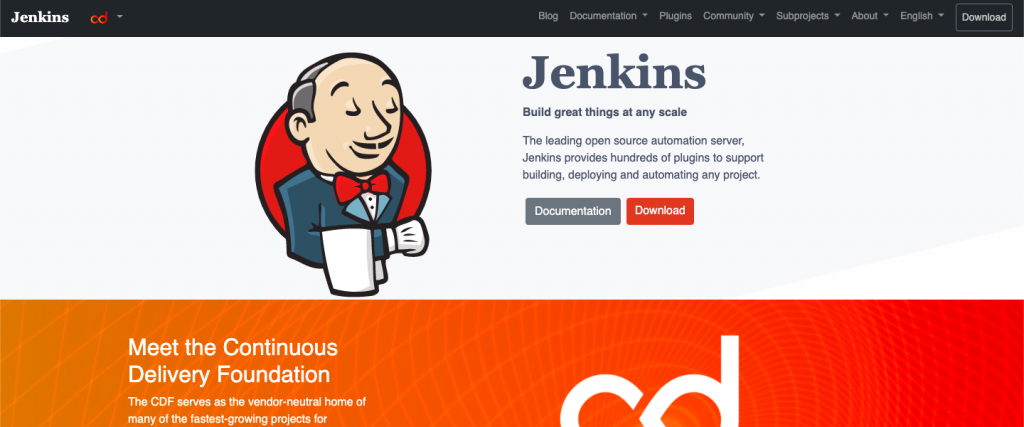
Jenkins is a cross-platform and one of the best CICD tools that can develop and test software projects continuously. Jenkins is developed in Java programming languages that offer real-time testing and reporting. It makes it easy for the developer to integrate changes into the projects. It provides various ways of building a pipeline and integration with many testing and deployment methodology.
The following are important features of Jenkins:
- It is available for Windows Mac OS x and Unix like operating systems also.
- It is a standalone java application and therefore it will work out of the box.
- It is having a very easy setup using the web interface.
- The interface also provides on the fly error checks and built-in help.
- Jenkins can be extended using its plugin architecture and therefore it provides nearly infinite possibilities.
TeamCity
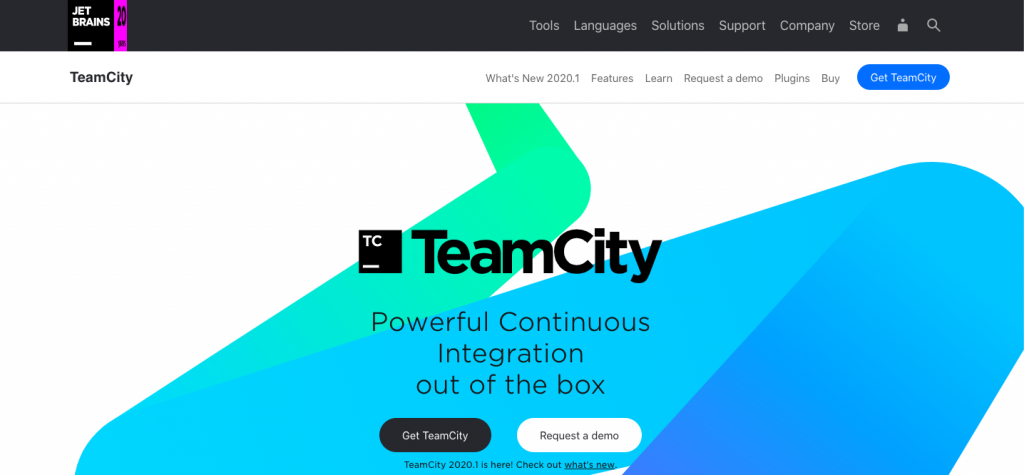
TeamCity from Jetbrains is an intelligent Continuous integration server solution for software environments of all sizes. With an ample amount of features integrated specifically for developers, one will not be disappointed by the level of performance that TeamCity adds to the team. Built to support modern software stacks and platforms, one can get started within minutes using pre-built installers.
The following are important features of TeamCity:
- Provides multiple ways to reuse settings and configurations of the parent project to the subproject.
- Runs parallel builds simultaneously in different environments.
- Enables running history builds, viewing test history reports, pinning, tagging, and adding builds to favourites.
- Easy to customize, interact, and extend the server.
- Keeps the CI server functional and stable.
GoCD
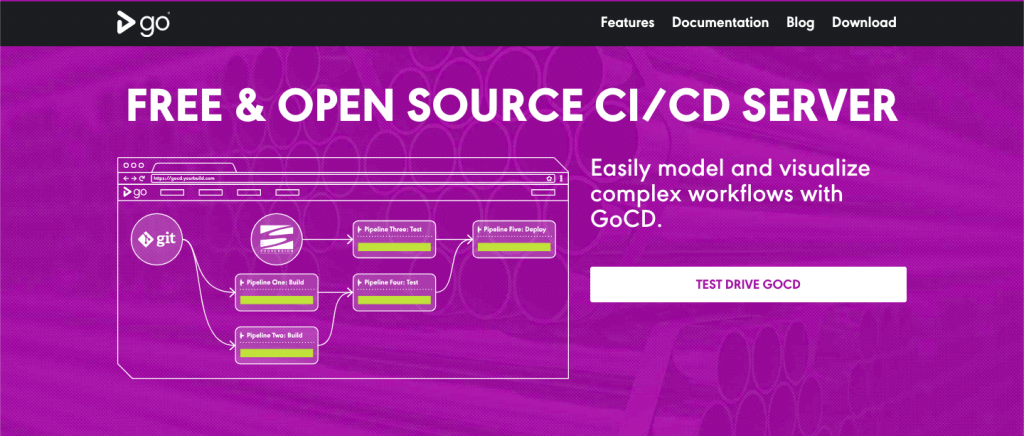
GoCD from Thoughtworks is an open-source Continuous integration that ranks among the top build automation tools for automating and streamlining build cycles, tests, and production releases. Among its standout abilities are enabling plugins or designing custom plugins for use, and the ability to set up multiple servers for data availability in case of emergency. This is one of the best CICD tools that can work with Windows, OSX, AWS AMIs, Docker, Debian/APT, RPM/YUM, and Zip.
The following are important features of GoCD:
- Supports parallel and sequential execution. Dependencies can be easily configured.
- Deploy any version, anytime
- Visualize end to end workflow in realtime with Value Stream Map.
- Deploy to production securely.
- Handle user authentication and authorization
Bamboo
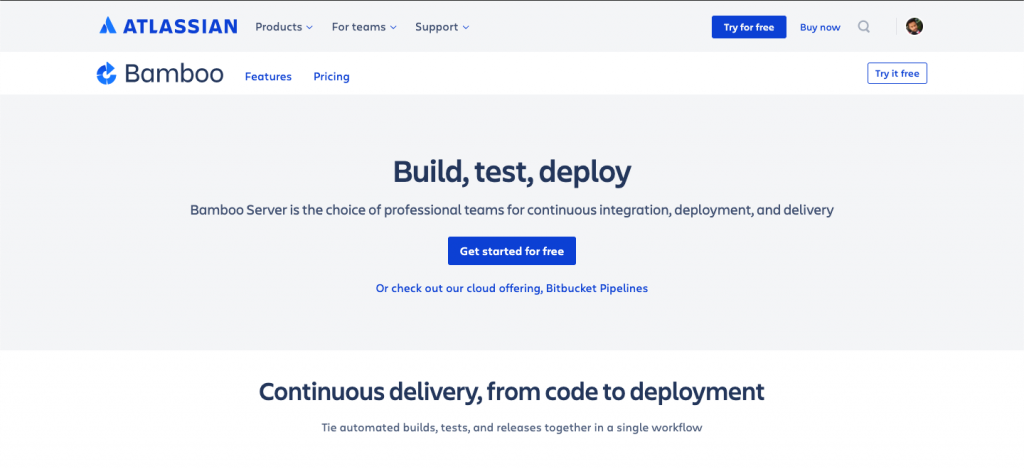
Bamboo is a Continuous Integration build server that performs the automatic build, test, and releases in a single place. It easily works with JIRA software and Bitbucket. Bamboo supports any type of languages and technologies like CodeDeply, Ducker, Maven, Git, SVN, Mercurial, Ant, AWS, Amazon S3 buckets.
Moreover, Bamboo identifies the new branches into these technologies and automatically applies to the customization of triggers and variables. The deployment and automation of this tool is very fast and easy. It is available for a free trial.
The following are important features of Bamboo:
- Use Bamboo with your favourite stack, including Docker, AWS, and S3; it works out of the box with your favourite coding language
- Custom deployment projects to archive the history of each of your release version
- Fix critical bugs quickly using custom agents that can be assigned for immediate builds
- A detailed outline of your code history before you deploy, helping you understand the progress you’re making
- Compatible with Bitbucket and JIRA for a comprehensive CI experience.
GitLab CI
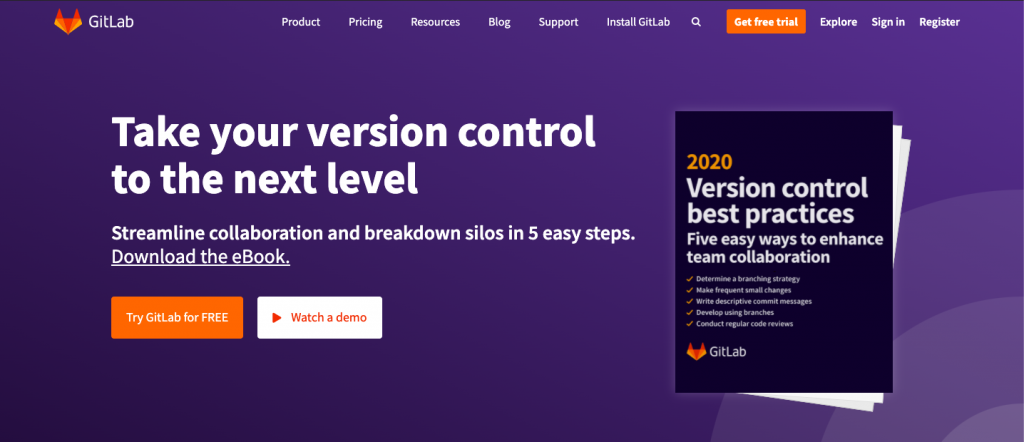
GitLab is a fast-growing code management platform for the modern developer. It offers best CICD tools for issue management, code views, continuous integration and deployment, all within a single dashboard. From an idea to production stages, with GitLab, you get to put yourself in a bird’s-eye view of how your project is growing and maturing. GitLab ships pre-built packages for well-known Linux distributions, it installs in minutes, has a friendly UI, and offers detailed documentation on every feature.
The following are important features of GitLab CI:
- It has multi-platform support and so the developers can execute and build the code on Windows, Linux, Mac, and many other operating systems.
- All the Gitlab builds are stable as the builds run on different machines.
- It can split a single build over multiple machines for faster build times.
- It allows everyone to get the pipeline that it needs for every build.
- There are multiple executors to test and run the build locally.
Circle CI
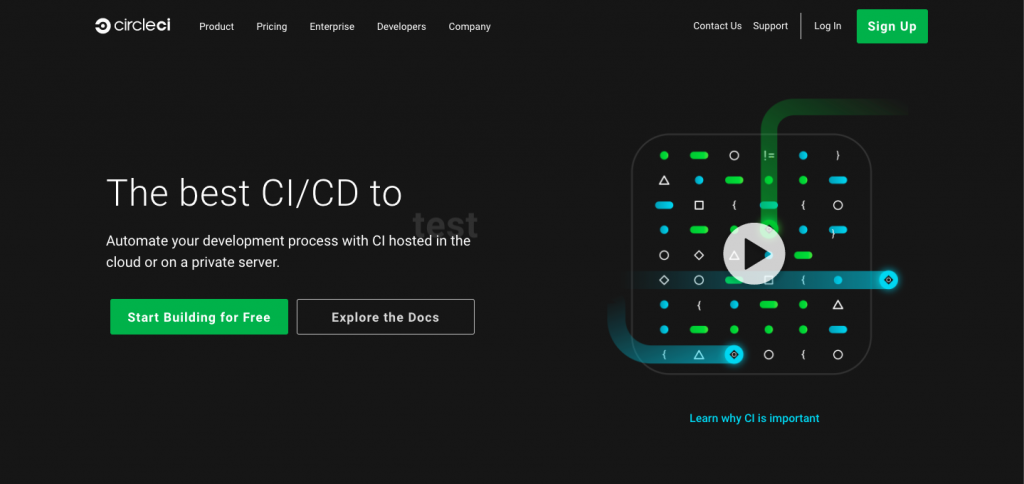
Circle CI is one of the best CICD tools that are out there. It has over 30 million builds every month on different operating systems such as Mac OS, Linux, Windows. It has employees in over 5 Continents. It as named as the leader in the Cloud Native continuous integration by Forrester Wave in 2019. Many popular brands use Circle CI for their products and a few among them are Facebook, Spotify, GoPro, and more.
The following are important features of Circle CI:
- Integrates with Bitbucket, GitHub, and GitHub Enterprise
- Runs build using a container or virtual machine
- Personalized email, and IM notifications
- Continuous and branch-specific deployment
- Automated merging and custom commands for package uploading
Codeship
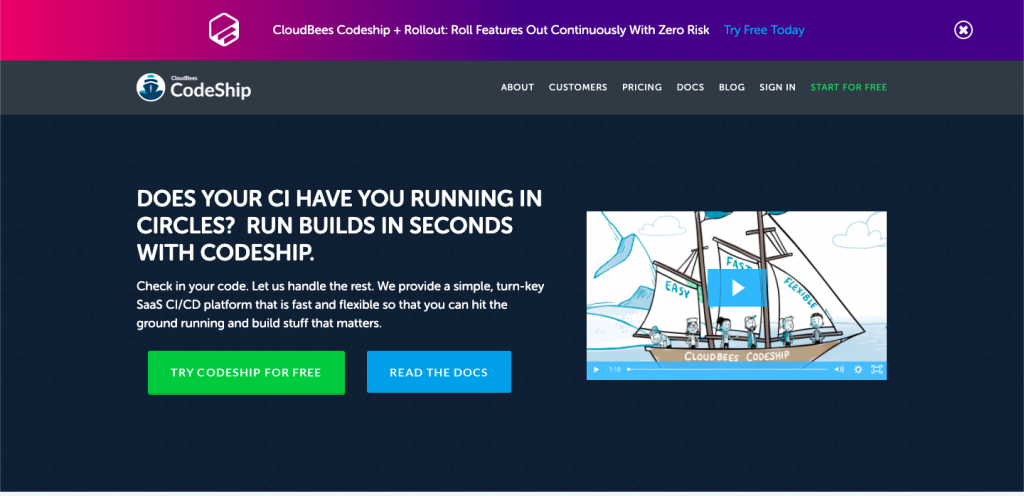
Recently acquired by Cloudbees, Codeship is a hosted CI platform designed for testing, building, and deploying directly from a GitHub project. This is one of the best CICD tools which is also known among users for its efficiency, simplicity, and speed due to a well-designed combination of features for integration and delivery for accurate code deployment following test automation.
The following are important features of Codeship:
- It provides full control of the design of your CICD systems.
- Centralized team management and dashboards
- Easily access debug builds and SSH which helps to debug right from CI environment
- Codeship gives complete control over customizing and optimizing CI and CD workflow
- It allows encrypted external caching of Docker images
CruiseControl
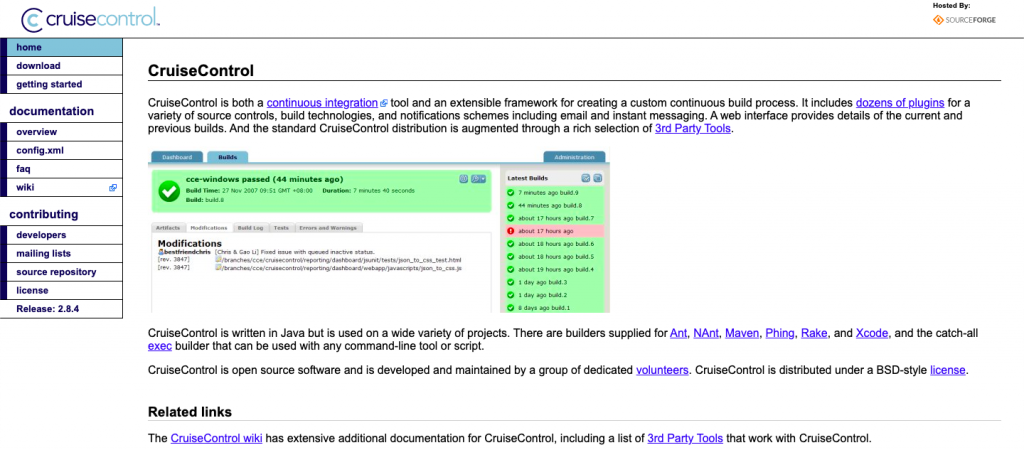
CruiseControl is a tool with an extensible framework. It is written in Java language but can be used on different types of projects. This tool supports many plugins for many different source controls, develops technologies, notification schemes, and instant messaging.
CruiseControl has a web-based user-friendly interface that provides details of the current and previous builds. It is an OSI certified open-source tool and distributed under a BSD license so anyone can free download its source code.
The following are important features of CruiseControl:
- Custom build loops for build cycles
- JSP reporting for managing build results
- GUI interface for build status visualization
- It also supports third-party tools
- The builders are supplied for Ant, Nant, Maven, Phing, Rake, and Xcode.
BuildBot
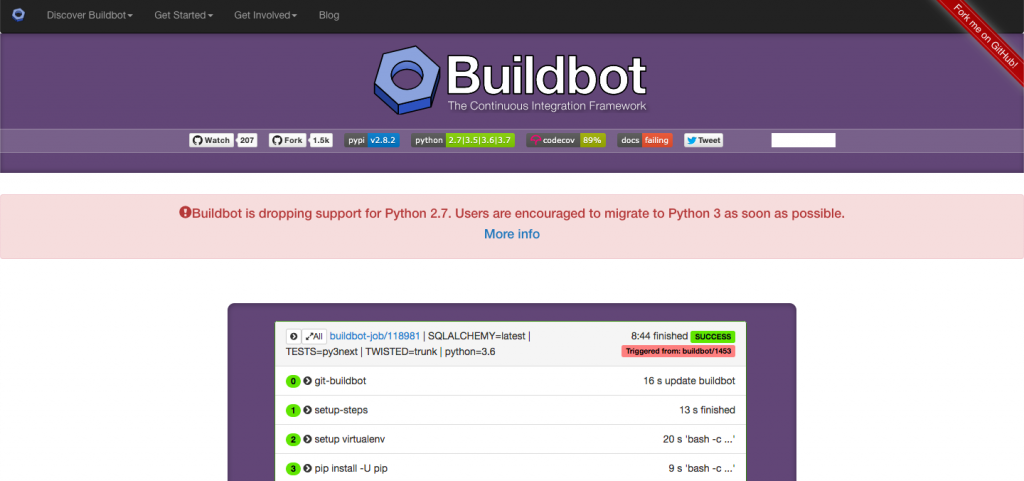
Buildbot is a Python-built Continuous integration testing framework, highly acclaimed among companies like Mozilla and Chromium. Buildbot’s primary function is to act as a bridge for concluding automated tests and builds. This tool supports not just CI testing but also automation of complex build systems, app deployment, and management of sophisticated software-release processes.
The following are important features of BuildBot:
- It supports continuous integration testing.
- Automation of complex building systems.
- Application deployment.
- Management of sophisticated software release process.
- Test on multiple platforms ensuring that code changes in one platform do not interfere with others.
Nevercode
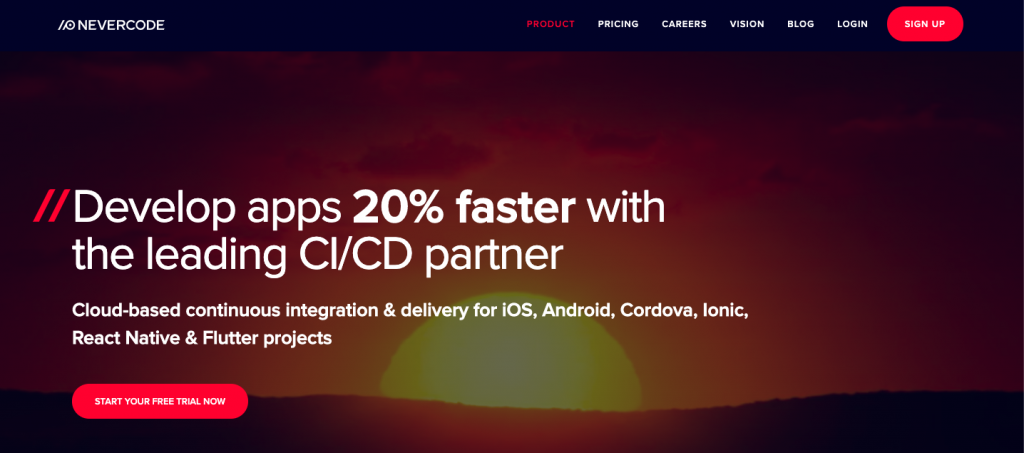
Nevercode wants to empower professionals such as developers and engineers to build a newer world. It emerged as a small idea for enabling mobile developers to develop mobile apps faster. It automated key steps in automating building, testing, distributing the application using a cloud platform. Their vision is to unlock the technology to make the code reach people without any barrier between the developers and the people.
The following are important features of Nevercode:
- It has automatic setup for Android, iOS, and many more.
- Test automation: unit and UI tests, code analysis, real device testing, test parallelization
- Automatic publishing: iTunes Connect, Google Play, Crashlytics, TestFairy, HockeyApp
- Detailed overview of your build and test status
- All the data that is stored in the server is encrypted to ensure user privacy.
Integrity
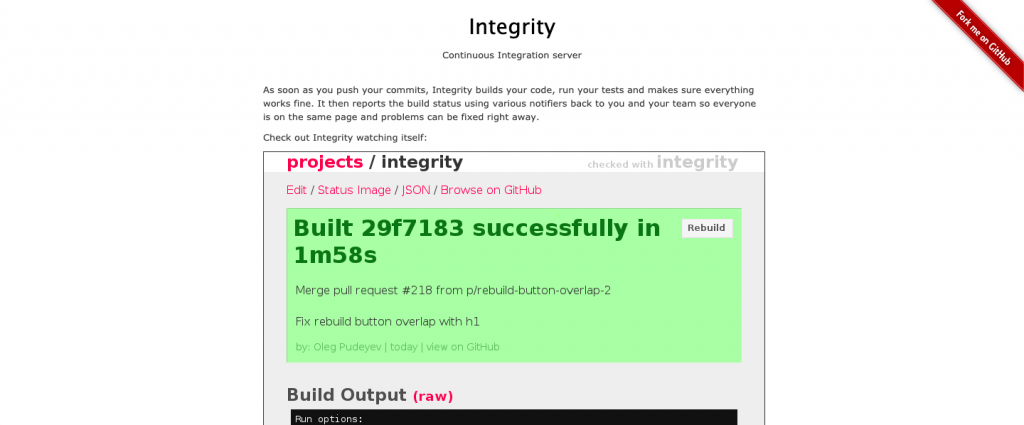
Integrity is a Continuous integration server that works only with GitHub. You can use other SCM tools with Integrity by using mirror repositories means GitHub mirror other SCM and then Integrity can use it. For this, you have to update the mirrored repositories continuously.
Integrity is built on Ruby. Whenever you commit the codes, then Integrity builds and runs the code. After that, it generates reports and provides notifications to the user.
The following are important features of Integrity:
- This is one of the best CICD tools that currently only works with git, but it can easily mirror with other SCM
- This CI tool supports numbers of notification mechanisms like AMQP, Email, HTTP, Amazon SES, Flowdock, Shell, and TCP.
- HTTP Notifier feature sends an HTTP POST request to the specific URL
- Installation takes a few lines on the command line shell
- Deploys with Thin, Unicorn, and supports Reverse Proxy web servers
Strider
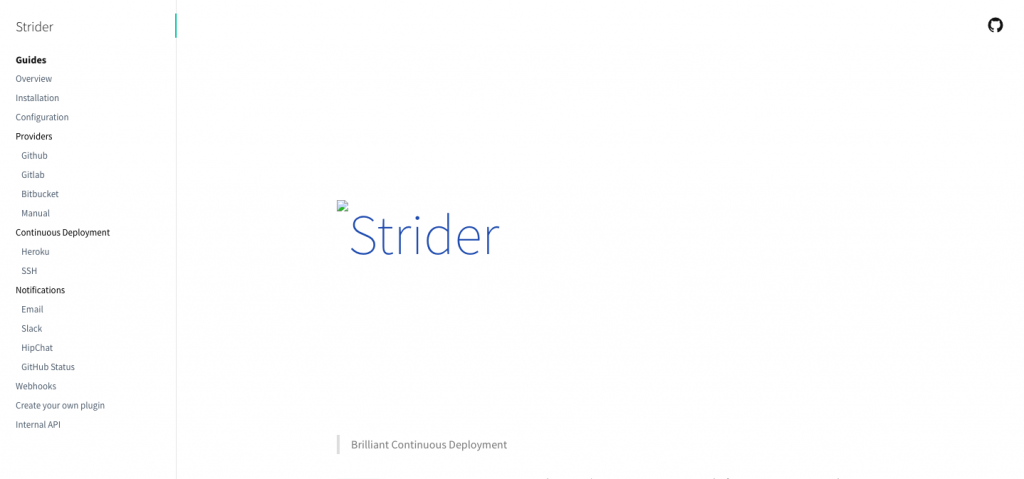
Strider is an open-source and one of the best CICD tools written with Node.js and JavaScript that integrates MongoDB as the back-end database storage. In addition to enabling custom server creation, Strider integrates with many projects such as GitHub, Bitbucket, Gitlab, etc. This CICD tool also provides powerful plugins to customize default functionalities among many other features.
The following are important features of Strider:
- Connects with GitHub, Gitlab, and Bitbucket for automated tests
- Developers can use existing, or code their plugins to extend features
- Easily deploys to Heroku for continuous deployment
- A well-organized Webhooks feature to add additional software functionality
- Extensive internal API with clear documentation
Autorabit

AutoRABIT is a product based B2B company focusing on Salesforce Automation. It has integration with industry-leading version control systems. It enables source driven deployment. Autorabit provides CICD solutions for various people such as Cocacola and more.
The following are important features of Autorabit:
- AutoRABIT is a cloud-based CI framework.
- The tool is specially designed to deploy on Salesforce Platform
- Lean and faster deployments based on changes supporting all the 120+ supported metadata types.
- It is available for a 14-days free trial.
FinalBuilder
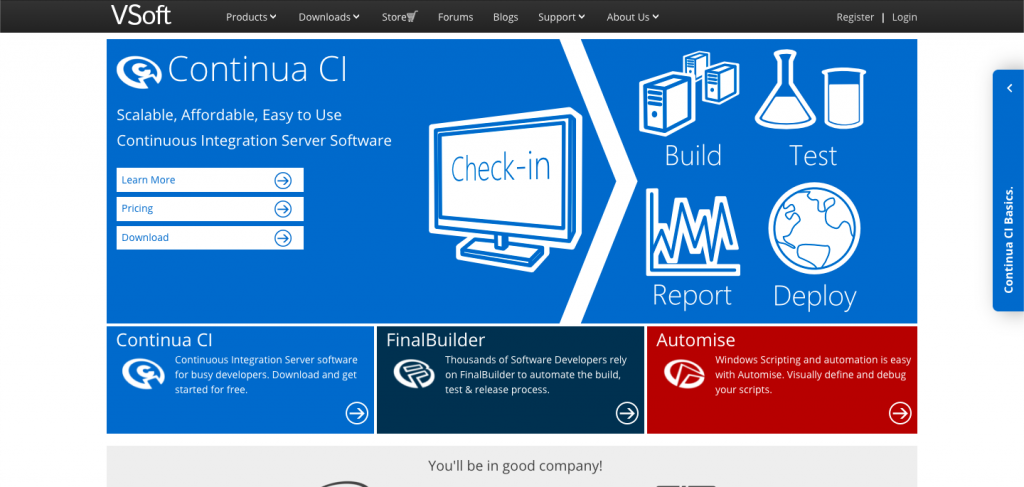
FinalBuilder is a Windows software for automating your build process. Despite being efficient to use by itself, it can integrate with any of your favourite Continuous integration servers, including Jenkins. The key feature of FinalBuilder is its flexible graphics interface that provides a straight-to-the-point visual outline of your build process. It can often take a long time to evolve a batch file or script to the point where it is reliable enough for use, whereas automating the build process with an automated build tool like FinalBuilder is quick and easy.
The following are important features of FinalBuilder:
- It presents build process in a logically structured, graphical interface
- It includes try and catch actions for localized error handling
- It provides tight integration with the Windows scheduling service, which allows builds to be scheduled
- FinalBuilder supports more than a dozen version control systems
- It provides support for scripting
Wercker
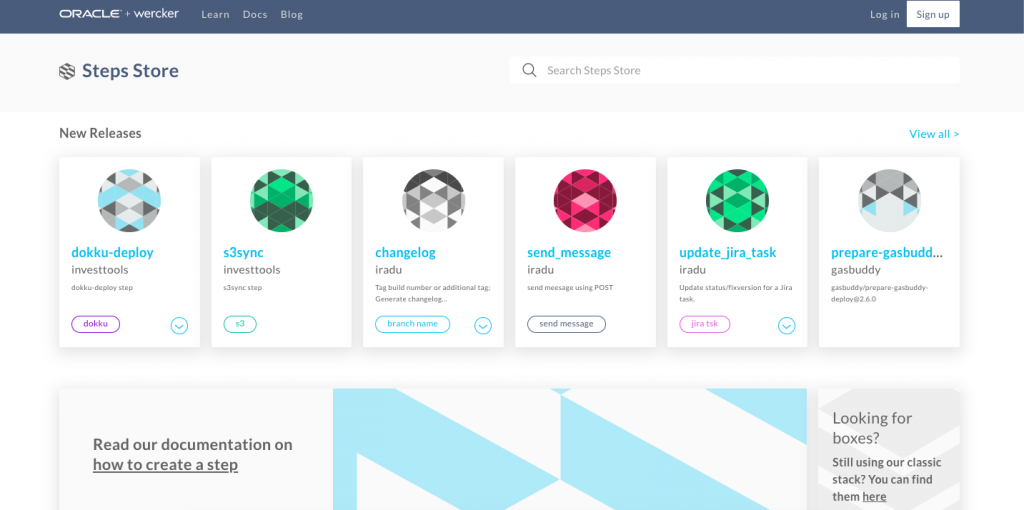
The Wercker CICD tool automates builds and deploys the container. It creates a unique automated pipeline (build and deploy pipelines) that are executed through the command-line interface. It provides the micro-services mean it triggers the pipelines when any new code is committed.
Wercker’s Docker stack performs processing very fast and avoids any threat or error. It isolates the applications and services from the operating system. To use Wercker, users can use either a free plan or virtual private cloud plan.
The following are important features of Wercker:
- Easy configuration management using YAML
- Spectacular UI of the main dashboard
- Seamless support for Bitbucket and GitHub projects
- Easy to setup for complex microservice architectures
- Concurrent pipelines for a streamlined deployment flow
Buildkite
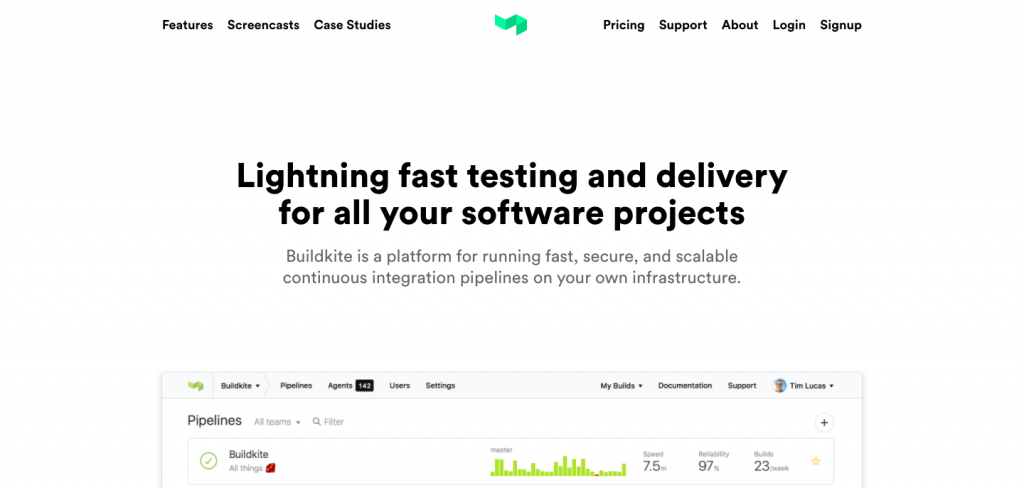
It lets the developers run a fast and scalable continuous integration pipeline in the infrastructure. The organization can run the opensource Build Kite agent on the infrastructure for maximum speed, control, and security. It is easy to install the package using the specific binaries that are available for almost all platforms such as Ubuntu, Debian, Mac, Windows, Docker, and more.
The following are important features of Buildkite:
- Limitless choice of languages and toolchains you can use
- Native support for Docker containers, but also Unix, Windows and OS X systems
- Control your versions using GitHub, GitLab, or any version control tool of your choice
- Distributed agents help you get the most out of your machine performance
- Web interface for triggering build pipelines
Semaphore
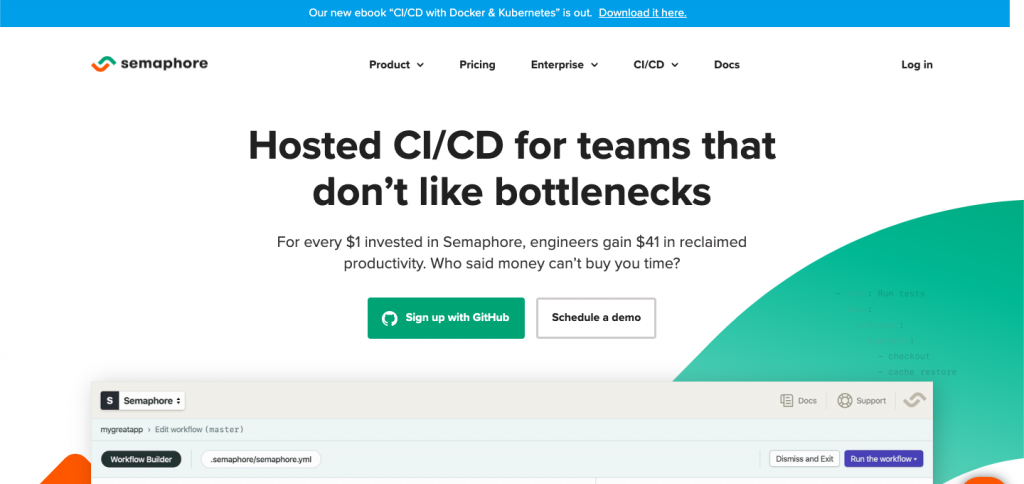
Semaphore is another one of the best CICD tools that provide cloud-based continuous integration and deployment built for speed and simplicity. With Semaphore your team can stay on top of the latest bugs and errors, way before they reach the attention of your users. With a seamless GitHub integration, the tests are automated the moment you plan to push out new code changes.
The following are important features of Semaphore:
- Integrated with GitHub
- Automates any continuous delivery pipeline
- Runs on the fastest CI/CD platform
- Native Docker support. Testing and deploying Docker-based applications
- It supports all major platforms such as Linux, Docker, iOS, Android.
Bitrise
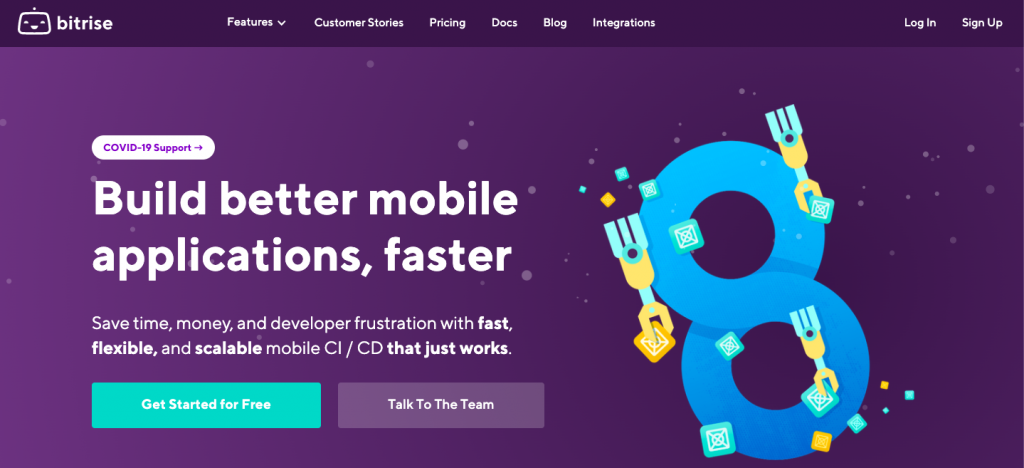
Bitrise is a very good solution for CICD as the developers are getting good reviews in the app store about their products. This is one of the best CICD tools that allows users to integrate into the right platform at the right time. It helps in automating the testing process, deliver the builds automatically, and shift the responsibility of delivering the product onto Bitrise shoulders.
The following are important features of Bitrise:
- It allows you to create and test workflows in your terminal
- You get your apps without the need for manual controls
- Every build runs individually in its virtual machine, and all data is discarded at the end of the build
- Support for third party beta testing and deployment services
- Support for GitHub Pull Request
UrbanCode
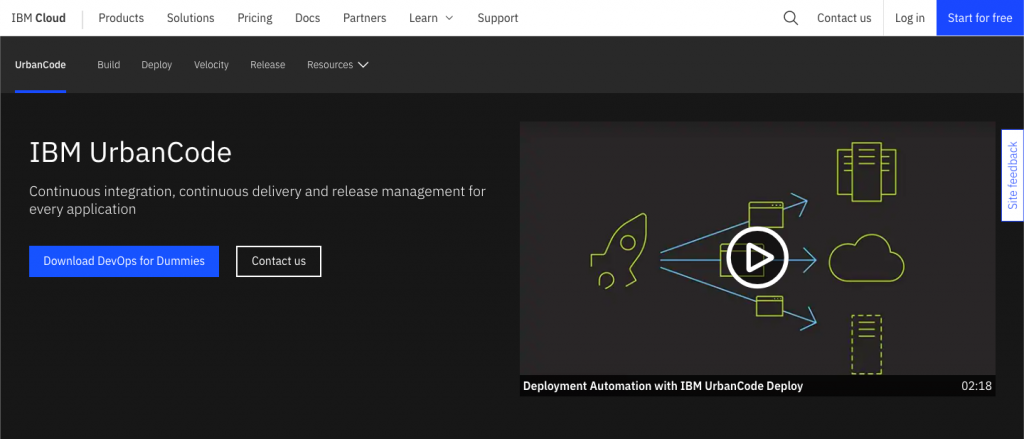
UrbanCode from IBM is developed to be used by serious software companies that require a concise integration of tools for managing complex builds, which cannot be managed effectively through the use of low-level tools.
Thousands of big corporations across the world are using uBuild to solve their most complex build needs. In Agile development, uBuild is used to automate CI builds, nightly builds, automated unit, deployments, releases, or any other process in the application lifecycle.
The following are important features of UrbanCode:
- Concise project templates for managing a range of configurations
- The platform stores all data history so that it can later be turned into a visual data report of global activity
- The pluggable environment allows you to use external (or custom-built internally) tools to compliment your workflow
- Manage your dependencies based on custom changes you make to the project outline
Check out: Best tools for DevOps

